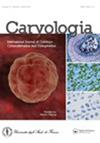Polyploid cytotypes and formation of unreduced male gametes in wild and cultivated fennel (Foeniculum vulgare Mill.)
IF 2.1
4区 生物学
Q2 Agricultural and Biological Sciences
引用次数: 0
Abstract
Foeniculum vulgare Mill. (2n=22) is an herbaceous species native to the Mediterranean region and naturalized in many temperate areas around the world. It includes subsp. piperitum and subsp. vulgare which are, respectively, the wild and cultivated forms. Fennel is of economic importance both as a vegetable crop and for its wide use in the food and pharmaceutical industries. In recent years, the therapeutic and pharmacological potential of this species has been widely analyzed, its cytogenetic traits have aroused less interest. Therefore, the intention of this study was to reduce this gap by investigating some aspects, such as the variations in its chromosome number and the occurrence of polyploidization events, so far neglected. By means of extensive chromosome counting, the presence of tetraploid cytotypes has been discovered both in the wild and cultivated fennel. Moreover, the analysis of pollen and PMCs at the tetrad stage provided evidence for spontaneous sexual polyploidization as the most probable origin of the tetraploid cytotypes discovered. The results of this study provide the first evidence of the occurrence of polyploidization events in F. vulgare and suggest that the use of 2n gametes could be a useful approach to genetic improvement of this crop.野生和栽培茴香(Foeniculum vulgare Mill.)多倍体细胞型和未减数雄配子的形成
普通小叶柄磨。(2n=22)是一种草本植物,原产于地中海地区,在世界上许多温带地区都有引种。它包括subsp。胡椒和亚种。它们分别是野生的和栽培的。茴香不仅是一种蔬菜作物,而且在食品和制药工业中有着广泛的应用,具有重要的经济价值。近年来,人们对该植物的治疗和药理潜力进行了广泛的研究,但其细胞遗传学特性却引起了人们的兴趣。因此,本研究的目的是通过研究迄今为止被忽视的一些方面,如其染色体数目的变化和多倍体事件的发生来缩小这一差距。通过广泛的染色体计数,在野生和栽培茴香中都发现了四倍体细胞型的存在。此外,对四分体时期花粉和pmc的分析提供了自发性多倍体是四倍体细胞型最可能起源的证据。本研究的结果首次证明了黄菖苣发生多倍体事件,并提示利用2n配子对黄菖苣进行遗传改良是一种有用的方法。
本文章由计算机程序翻译,如有差异,请以英文原文为准。
求助全文
约1分钟内获得全文
求助全文
来源期刊

Caryologia
生物-遗传学
CiteScore
1.60
自引率
23.80%
发文量
26
审稿时长
12 months
期刊介绍:
Caryologia is devoted to the publication of original papers, and occasionally of reviews, about plant, animal and human karyological, cytological, cytogenetic, embryological and ultrastructural studies. Articles about the structure, the organization and the biological events relating to DNA and chromatin organization in eukaryotic cells are considered. Caryologia has a strong tradition in plant and animal cytosystematics and in cytotoxicology. Bioinformatics articles may be considered, but only if they have an emphasis on the relationship between the nucleus and cytoplasm and/or the structural organization of the eukaryotic cell.
 求助内容:
求助内容: 应助结果提醒方式:
应助结果提醒方式:


